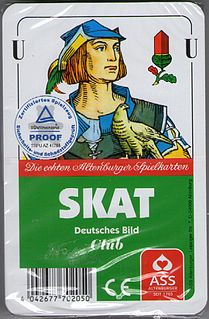 W
WSkat, historically Scat, is a three-player trick-taking card game of the Ace-Ten family, devised around 1810 in Altenburg in the Duchy of Saxe-Gotha-Altenburg. It is the national game of Germany and, along with Doppelkopf, it is the most popular card game in Germany and Silesia and one of the most popular in the rest of Poland. A variant of 19th century Skat it is popular in the US. John McLeod considers it one of the best and most interesting card games for three players, and Kelbet described it as "the king of German card games."
 W
WThe following is a glossary of Skat terms used in playing the card game of Skat. Although Skat has German origins, it has now become an international game, often played to official rules. This glossary includes terms which are common or regional, official or unofficial, as well as those used for special situations, starting hands, card combinations and terms relating to players. Many of the terms are also used in other trick-taking or Ace-Ten games or even in card games in general.
 W
WOfficers' Skat (Offiziersskat), is a trick-taking card game for two players which is based on the rules of Skat. It may be played with a German or French pack of 32 cards which, from the outset of the game, are laid out in rows both face down and face up. As in Skat, tricks are taken and card points counted to determine the winner of a round; game points are then awarded to decide the winner of a game. It is also called Two-hand Skat, Sailors' Skat (Seemannsskat), Farmers' Skat (Bauernskat), Robbers' Skat (Räuberskat) or Coachmen's Skat (Kutscherskat)
 W
WThe term hand game is used in a number of card games, and can refer to a game where a player draws no additional cards and plays only from their hand, a game where a player uses both their own hand and that of an opponent, or a move where a player is able to play their entire hand in one turn.
 W
WThe history of the game of Skat or Scat began in the early 19th century in Thuringia. The game spread rapidly within German-speaking Europe and is now one of the most popular card games in Germany as well as being considered Germany's national card game.
 W
WOfficers' Skat (Offiziersskat), is a trick-taking card game for two players which is based on the rules of Skat. It may be played with a German or French pack of 32 cards which, from the outset of the game, are laid out in rows both face down and face up. As in Skat, tricks are taken and card points counted to determine the winner of a round; game points are then awarded to decide the winner of a game. It is also called Two-hand Skat, Sailors' Skat (Seemannsskat), Farmers' Skat (Bauernskat), Robbers' Skat (Räuberskat) or Coachmen's Skat (Kutscherskat)
 W
WRéunion, Reunion or Vereinigungsspiel is an historical German point-trick game for three players which, despite its French name, appears to have originated in the Rhineland. It is a 10-card game of the Ace-Ten family and uses a 32-card French-suited piquet pack or 32-card Skat pack. Players who cannot follow suit must trump. Otherwise the game can be described as a simplified version of Skat, but is also reminiscent of Euchre with its two permanent top trumps, the Right and Left Bowers.
 W
WOfficers' Skat (Offiziersskat), is a trick-taking card game for two players which is based on the rules of Skat. It may be played with a German or French pack of 32 cards which, from the outset of the game, are laid out in rows both face down and face up. As in Skat, tricks are taken and card points counted to determine the winner of a round; game points are then awarded to decide the winner of a game. It is also called Two-hand Skat, Sailors' Skat (Seemannsskat), Farmers' Skat (Bauernskat), Robbers' Skat (Räuberskat) or Coachmen's Skat (Kutscherskat)
 W
WOfficers' Skat (Offiziersskat), is a trick-taking card game for two players which is based on the rules of Skat. It may be played with a German or French pack of 32 cards which, from the outset of the game, are laid out in rows both face down and face up. As in Skat, tricks are taken and card points counted to determine the winner of a round; game points are then awarded to decide the winner of a game. It is also called Two-hand Skat, Sailors' Skat (Seemannsskat), Farmers' Skat (Bauernskat), Robbers' Skat (Räuberskat) or Coachmen's Skat (Kutscherskat)
 W
WSolo 66 is a trick-taking, Ace-Ten, card game for five players in which a soloist always plays against the other four. It is based on the rules of Germany's national game, Skat, and is played with a French-suited Skat pack of 32 cards. Bidding is for the trump suit. Jacks are ranked within their respective suits and do not form additional trumps over and above the cards of the trump suit. Grupp describes it as "an entertaining game for a larger group."